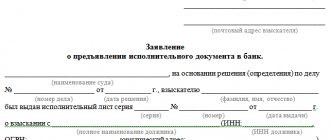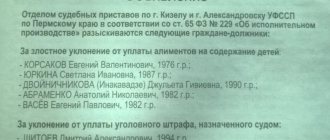Where is the writ of execution submitted?
There are several options for how a writ of execution can be presented for collection. According to the Federal Law “On Enforcement Proceedings”, you have the right to submit a writ of execution to the territorial branch of the Bailiff Service. This can be a branch located both at the place of residence (registration) of the debtor, and at the place of his stay (actual location), as well as at the location of his property.
In addition, you can bypass the appeal to the bailiffs and submit a writ of execution to the bank where the debtor’s current account is opened. To find out which bank the debtor uses, contact any tax authority with an application to provide information about the debtor’s accounts - and you will be able to receive this information after 7 days. And if your debtor is a citizen from the public sector, then you can start with Sberbank: given the share of the banking market that it occupies, the chances of writing off the debtor’s money “at random” are quite high. The bank that has received the writ of execution from the claimant is obliged to independently establish accounts and write off funds from all existing accounts within the amount specified in the writ of execution.
Finally, the writ of execution can be presented to the organization that pays the debtor-citizen periodic payments (salary, pension, scholarship). This could be the debtor’s employer company, a pension fund, an educational institution, etc. The legislation allows this method of collection if the amount of the debt does not exceed 25,000 rubles or if the writ of execution compensates for harm to health, alimony or other periodic payments are collected.
How to properly fill out an application to the bailiff service?
If it is impossible to collect the debt with the help of banks, employers and other organizations, you should contact the Bailiff Service.
Enforcement proceedings are initiated by a bailiff based on an application from the claimant or his representative. The application to initiate enforcement proceedings is accompanied by the original writ of execution and the representative’s power of attorney (if he signs the application himself).
Before submitting the writ of execution, it is important to check whether the three-year period for presenting the writ of execution has expired, whether all the necessary information is indicated in the writ of execution (for the list of requirements, see Article 13 of the Federal Law “On Enforcement Proceedings”) and whether there are any errors in the writ of execution. Otherwise, the bailiff is obliged to refuse to initiate enforcement proceedings. True, it is worth noting that, for example, in recent years, judicial practice has been critical of refusals to initiate enforcement proceedings due to the lack of information about the debtor’s place of birth in the writ of execution, pointing out the insignificance of this identifying information (see Resolution of the Arbitration Court of the Ural District dated October 7, 2015 in case No. A60-19042/2015).
Particular attention should be paid to the power of attorney, that is, the powers of the representative. The text of the power of attorney must indicate the right of the authorized person to present and revoke the executive document. Otherwise, the bailiff will issue a decision to refuse to initiate enforcement proceedings and return the writ of execution. It is also worth knowing about other powers of the representative, which are specifically stipulated in the power of attorney. Such powers are:
- transfer of authority to another person (subassignment),
- appealing decisions and actions (inaction) of the bailiff,
- receiving the awarded property,
- refusal of recovery under a writ of execution,
- conclusion of a settlement agreement.
Thus, when preparing a power of attorney, you need to check whether the scope of powers specified in the power of attorney corresponds to those powers that are actually necessary when representing the interests of the claimant.
It is important to carefully work on the content of the application. The application must indicate requests for seizure of property of which you are aware:
- information about bank accounts,
- real estate (you can make requests in advance and attach an extract from the Unified State Register to the application),
- motor transport (you may have taken a copy of the vehicle registration certificate),
- information about the place of work (indicate employer details, address, telephone number),
- information from the Unified State Register of Legal Entities on the rights to the debtor’s shares in organizations,
- information about the spouse of the debtor-citizen (the spouse’s property may be arrested, and the creditor may demand the allocation of the debtor’s share through the court).
Sometimes, due to a lack of information in the application, the bailiff carries out enforcement proceedings for several months, when this could have been done much faster.
When submitting documents to the office of the bailiff department, we recommend that you immediately inquire which bailiff will receive the writ of execution, find out his office number and contact telephone number. The claimant's application and the writ of execution are transferred from the office to the bailiff within 3 days. It is important to monitor compliance with this deadline (you can call or come again). In enforcement proceedings, non-working days and holidays are not taken into account when determining the period. In practice, there are cases when, without any legal grounds, an executive document can lie in the office for more than a year.
The bailiff, within three days from the date of receipt of the enforcement document, issues a decision to initiate enforcement proceedings or to refuse to initiate enforcement proceedings. This process also cannot be ignored: if necessary, you need to remind the bailiff of the deadline established by law.
It is noteworthy that the claimant now has the opportunity to receive information about the progress of enforcement proceedings via e-mail. To do this, you must provide your email address in the application to initiate enforcement proceedings or in a separate notification. In addition, it has become possible to send electronic appeals through the personal account of a party to enforcement proceedings on the website of the Bailiff Service. Electronic interaction in this field is still being improved, but is already producing modest results, allowing for the prompt receipt and transmission of information, statements and petitions.
Information about the initiation of enforcement proceedings and the data of the bailiff who is conducting the proceedings can also be obtained from the Data Bank of Enforcement Proceedings on the Bailiff Service website. In addition, you can subscribe to changes in information on your debtor’s enforcement proceedings, which is very useful.
In addition, we recommend that you subscribe to change information about the debtor on the arbitration case filing website. If bankruptcy proceedings are initiated against the debtor, you will have two months (from the date of publication) to include your claims in the register of creditors' claims for their subsequent satisfaction from the debtor's bankruptcy estate. At the end of the procedure, the bankrupt organization will be excluded from the register of legal entities, and the bankrupt citizen may be released from paying debts.
Method to collect debt under writ of execution No. 1:
If the debtor is an organization or individual entrepreneur:
If during the consideration of the case you became aware of data about the debtor’s open accounts, you, in accordance with Art. 8 of the Federal Law of October 2, 2007 No. 229-FZ “On Enforcement Proceedings”, the person has the right to send a writ of execution directly to the bank or other credit institution in which the debtor has an account. Along with the writ of execution, an application is submitted to the bank, which must contain the following information:
- details of the claimant's bank account to which the collected funds should be transferred;
- last name, first name, patronymic, citizenship, details of an identity document, place of residence or place of stay, taxpayer identification number (if available), details of a migration card and a document confirming the right to stay (residence) in the Russian Federation of the claimant-citizen;
- name, taxpayer identification number or code of a foreign organization, state registration number, place of state registration and legal address of the claimant - a legal entity.
The application must be completed in two copies (one is given to the bank, the second remains with you with the signature of the person who accepted the documents, date and seal)
If you do not have information about the debtor’s open accounts and you do not know which bank to contact, then you must:
- Make a notarized copy of the writ of execution;
- Having made a notarized copy of the writ of execution, you have the right to contact the tax office to request the following information:
- on the name and location of banks and other credit organizations in which the debtor’s accounts are opened;
- on current account numbers, quantity and flow of funds in rubles and foreign currency;
In this case, the tax authorities are required to provide a response to the requested information within seven days from the date of receipt of the request. We advise you to indicate in your request that the response must be provided on purpose (otherwise the deadline may be delayed due to postal work)
After you have received answers from the tax office about open accounts, if there are any, then you can submit a writ of execution to all banks, as we recommended earlier.
If the debtor is an individual:
The procedure for obtaining information from the tax office about the open accounts of a debtor - an individual is identical to the procedure described above for legal entities.
It is worth noting that you need to contact the tax office with which the debtor is registered; you can find the contact details for a specific tax service by clicking on this link.
collect debt under writ of execution No. 2:
If the debtor does not have open accounts or lacks funds, then it is necessary to contact the bailiff service with an application to initiate enforcement proceedings. Enforcement proceedings are initiated by the bailiff at the place of residence/registration of the debtor. You can determine which bailiff department you need to contact by clicking on the link.
So, after determining the bailiff department, it is necessary to draw up an application (in two copies), attach a writ of execution to the application and submit it to the office of the FSSP department. We do not recommend sending your application by mail.
Application requirements:
- The application must be signed by the claimant or his representative;
- If the application is signed by a representative, a power of attorney must be attached to the application;
- The application may contain requests from the prospector (in particular, to seize the debtor’s property, as well as to establish restrictions provided for by law)
- It is better for the claimant to attach to the application documents containing information about the debtor.
This is important to know: Act on failure to sign an order for disciplinary action
Pay attention to the deadlines! The application to initiate enforcement proceedings, together with the writ of execution, is submitted to the bailiff within three days from the date of their receipt by the bailiff department. After the bailiff receives an application to initiate enforcement proceedings, the bailiff, within three days, issues a decision to initiate enforcement proceedings or to refuse to initiate enforcement proceedings.
Grounds for refusal to initiate enforcement proceedings:
The bailiff, within three days from the date of receipt of the enforcement document, issues a decision to initiate enforcement proceedings or to refuse to initiate enforcement proceedings. 1) the enforcement document is presented without the claimant’s application or the application is not signed by the claimant or his representative, except for cases where enforcement proceedings are subject to initiation without the claimant’s application; 2) the executive document was not presented at the place where the enforcement actions were performed, except for the case provided for in Part 4 of Article 30 of this Federal Law; 3) the deadline for presenting the writ of execution for execution has expired and has not been restored by the court; 4) the document is not executive or does not meet the requirements for executive documents established by Article 13 of this Federal Law; 5) the executive document was previously presented for execution and enforcement proceedings on it were terminated on the grounds established by Article 43 and Part 14 of Article 103 of this Federal Law; 6) the executive document was previously presented for execution and enforcement proceedings on it were completed on the grounds established by paragraphs 1 and 2 of part 1 of Article 47 and paragraph 1 of part 15 of Article 103 of this Federal Law; 7) a judicial act, an act of another body or official, which is an executive document or on the basis of which an executive document was issued, has not entered into legal force, with the exception of executive documents subject to immediate execution; the writ of execution in accordance with the legislation of the Russian Federation is not subject to execution by the Federal Bailiff Service; 9) the executive document is presented for execution in violation of the provisions provided for in Part 2.1 of Article 30 of this Federal Law; 10) the executive document contains a requirement for the return of a child illegally transferred to the Russian Federation or held in the Russian Federation or for the exercise of access rights in relation to such a child on the basis of an international treaty of the Russian Federation and the child has reached the age after which the specified international treaty is not subject to application in relation to this child; 11) the executive document is presented for execution in violation of the provisions provided for in Part 9 of Article 21 of this Federal Law. 2. A copy of the bailiff’s decision to refuse to initiate enforcement proceedings, with the attachment of all received documents no later than the day following the day of the said decision, is sent to the recoverer, as well as to the court, other body or official who issued the executive document. 3. Elimination of the circumstances provided for in paragraphs 1 - 4 and 7 of part 1 of this article does not prevent the re-sending (presentation) of the writ of execution to the bailiff.
1) the enforcement document is presented without the claimant’s application or the application is not signed by the claimant or his representative, except for cases where enforcement proceedings are subject to initiation without the claimant’s application; 2) the executive document was not presented at the place where the enforcement actions were performed, except for the case provided for in Part 4 of Article 30 of this Federal Law; 3) the deadline for presenting the writ of execution for execution has expired and has not been restored by the court; 4) the document is not executive or does not meet the requirements for executive documents established by Article 13 of this Federal Law; 5) the executive document was previously presented for execution and enforcement proceedings on it were terminated on the grounds established by Article 43 and Part 14 of Article 103 of this Federal Law; 6) the executive document was previously presented for execution and enforcement proceedings on it were completed on the grounds established by paragraphs 1 and 2 of part 1 of Article 47 and paragraph 1 of part 15 of Article 103 of this Federal Law; 7) a judicial act, an act of another body or official, which is an executive document or on the basis of which an executive document was issued, has not entered into legal force, with the exception of executive documents subject to immediate execution; the writ of execution in accordance with the legislation of the Russian Federation is not subject to execution by the Federal Bailiff Service; 9) the executive document is presented for execution in violation of the provisions provided for in Part 2.1 of Article 30 of this Federal Law; 10) the executive document contains a requirement for the return of a child illegally transferred to the Russian Federation or held in the Russian Federation or for the exercise of access rights in relation to such a child on the basis of an international treaty of the Russian Federation and the child has reached the age after which the specified international treaty is not subject to application in relation to this child; 11) the executive document is presented for execution in violation of the provisions provided for in Part 9 of Article 21 of this Federal Law. 2. A copy of the bailiff’s decision to refuse to initiate enforcement proceedings, with the attachment of all received documents no later than the day following the day of the said decision, is sent to the recoverer, as well as to the court, other body or official who issued the executive document. 3. Elimination of the circumstances provided for in paragraphs 1 - 4 and 7 of part 1 of this article does not prevent the re-sending (presentation) of the writ of execution to the bailiff.
After the bailiff initiates enforcement proceedings, the debtor is given time to voluntarily comply with the requirements of the writ of execution. Please note that the period for the debtor’s voluntary compliance with the requirements of the writ of execution is calculated from the moment the debtor receives the decision to initiate enforcement proceedings and is 5 days.
How to collect a debt under a writ of execution through the bailiff service?
In fact, bailiffs have enough power to force a debtor to pay off their debts; see for yourself what a bailiff can do:
Executive actions
Enforcement actions are those carried out by a bailiff, aimed at creating conditions for the application of enforcement measures, as well as forcing the debtor to complete, correct and timely fulfillment of the requirements contained in the enforcement document. The bailiff has the right:
1) summon the parties to enforcement proceedings (their representatives), other persons in cases provided for by the legislation of the Russian Federation; 2) request the necessary information, including personal data, from individuals, organizations and bodies located on the territory of the Russian Federation, as well as on the territories of foreign states, in the manner established by the international treaty of the Russian Federation, receive explanations, information, certificates from them ; 3) conduct an inspection, including an inspection of financial documents, regarding the execution of executive documents; 4) give instructions to individuals and legal entities to fulfill the requirements contained in executive documents; 5) enter non-residential premises occupied by the debtor or other persons or belonging to the debtor or other persons for the purpose of executing enforcement documents; 6) with the permission in writing of the senior bailiff (and in the case of execution of a writ of execution on the move-in of the claimant or eviction of the debtor - without the said permission) to enter the residential premises occupied by the debtor without the consent of the debtor; 7) in order to ensure the execution of a writ of execution, seize property, including cash and securities, seize said property, transfer seized and seized property for storage; in the manner and within the limits established by this Federal Law, evaluate the property; 9) engage specialists who meet the requirements of the legislation of the Russian Federation on valuation activities (hereinafter referred to as the appraiser) to evaluate property; 10) search for the debtor, his property, search for the child independently or with the involvement of internal affairs bodies; 11) request the necessary information from the parties to enforcement proceedings; 12) consider applications and petitions of the parties to enforcement proceedings and other persons participating in enforcement proceedings; 13) collect enforcement fees; 14) apply to the body that carries out state registration of rights to property and transactions with it (hereinafter referred to as the registration body) to register the property owned by him in the name of the debtor in the cases and in the manner established by this Federal Law; 15) establish temporary restrictions on the debtor’s departure from the Russian Federation; 15.1) establish temporary restrictions on the debtor’s use of the special right granted to him in accordance with the legislation of the Russian Federation; 16) verify the correctness of the withholding and transfer of funds under a judicial act, an act of another body or official, as well as the correctness of debits from the debtor’s personal account in the register maintenance system and securities accounts in depositories opened by a professional participant in the securities market in accordance with the Federal Law dated April 22, 1996 N 39-FZ “On the Securities Market” (hereinafter referred to as the personal account and securities account), and crediting to the personal account or securities account of the collector of issue-grade securities at the request of the collector or on his own initiative, including by executive documents presented in the manner prescribed by Part 1 of Article 8, Part 1 of Article 8.1 and Part 1 of Article 9 of this Federal Law. When conducting such an inspection, the organization or other person specified in Part 1 of Article 8, Part 1 of Article 8.1 and Part 1 of Article 9 of this Federal Law is required to submit to the bailiff the relevant accounting and other documents; 16.1) offset counterclaims of the same type, confirmed by enforcement documents on the collection of funds; 17) perform other actions necessary for the timely, complete and correct execution of executive documents.
2) request the necessary information, including personal data, from individuals, organizations and bodies located on the territory of the Russian Federation, as well as on the territories of foreign states, in the manner established by the international treaty of the Russian Federation, receive explanations, information, certificates from them ; 3) conduct an inspection, including an inspection of financial documents, regarding the execution of executive documents; 4) give instructions to individuals and legal entities to fulfill the requirements contained in executive documents; 5) enter non-residential premises occupied by the debtor or other persons or belonging to the debtor or other persons for the purpose of executing enforcement documents; 6) with the permission in writing of the senior bailiff (and in the case of execution of a writ of execution on the move-in of the claimant or eviction of the debtor - without the said permission) to enter the residential premises occupied by the debtor without the consent of the debtor; 7) in order to ensure the execution of a writ of execution, seize property, including cash and securities, seize said property, transfer seized and seized property for storage; in the manner and within the limits established by this Federal Law, evaluate the property; 9) engage specialists who meet the requirements of the legislation of the Russian Federation on valuation activities (hereinafter referred to as the appraiser) to evaluate property; 10) search for the debtor, his property, search for the child independently or with the involvement of internal affairs bodies; 11) request the necessary information from the parties to enforcement proceedings; 12) consider applications and petitions of the parties to enforcement proceedings and other persons participating in enforcement proceedings; 13) collect enforcement fees; 14) apply to the body that carries out state registration of rights to property and transactions with it (hereinafter referred to as the registration body) to register the property owned by him in the name of the debtor in the cases and in the manner established by this Federal Law; 15) establish temporary restrictions on the debtor’s departure from the Russian Federation; 15.1) establish temporary restrictions on the debtor’s use of the special right granted to him in accordance with the legislation of the Russian Federation; 16) verify the correctness of the withholding and transfer of funds under a judicial act, an act of another body or official, as well as the correctness of debits from the debtor’s personal account in the register maintenance system and securities accounts in depositories opened by a professional participant in the securities market in accordance with the Federal Law dated April 22, 1996 N 39-FZ “On the Securities Market” (hereinafter referred to as the personal account and securities account), and crediting to the personal account or securities account of the collector of issue-grade securities at the request of the collector or on his own initiative, including by executive documents presented in the manner prescribed by Part 1 of Article 8, Part 1 of Article 8.1 and Part 1 of Article 9 of this Federal Law. When conducting such an inspection, the organization or other person specified in Part 1 of Article 8, Part 1 of Article 8.1 and Part 1 of Article 9 of this Federal Law is required to submit to the bailiff the relevant accounting and other documents; 16.1) offset counterclaims of the same type, confirmed by enforcement documents on the collection of funds; 17) perform other actions necessary for the timely, complete and correct execution of executive documents.
Enforcement measures
Enforcement measures are the actions specified in the writ of execution, or actions performed by the bailiff in order to obtain from the debtor property, including money, subject to recovery under the writ of execution:
1) foreclosure on the debtor’s property, including cash and securities; 2) foreclosure on periodic payments received by the debtor due to labor, civil or social legal relations; 3) foreclosure of the debtor’s property rights, including the right to receive payments in enforcement proceedings in which he acts as a claimant, the right to receive payments for hire, rent, as well as exclusive rights to the results of intellectual activity and means of individualization, rights of claim under agreements on the alienation or use of the exclusive right to the result of intellectual activity and a means of individualization, the right to use the result of intellectual activity or a means of individualization, owned by the debtor as a licensee; 4) seizure from the debtor of property awarded to the claimant, as well as by a notary’s writ of execution in cases provided for by federal law; 5) seizure of the debtor’s property located with the debtor or third parties, in pursuance of a judicial act on the seizure of property; 6) applying to the registration authority to register the transfer of the right to property, including securities, from the debtor to the claimant in the cases and in the manner established by this Federal Law; 7) performance on behalf and at the expense of the debtor of an action specified in a writ of execution, if this action can be performed without the personal participation of the debtor; forced entry of the claimant into the residential premises; 9) forced eviction of the debtor from the residential premises; 10) forced release of non-residential premises from the presence of the debtor and his property in it; 10.1) forced expulsion from the Russian Federation of foreign citizens or stateless persons; 10.2) forced release of the land plot from the presence of the debtor and his property on it; 11) other actions provided for by federal law or executive document.
2) foreclosure on periodic payments received by the debtor due to labor, civil or social legal relations; 3) foreclosure of the debtor’s property rights, including the right to receive payments in enforcement proceedings in which he acts as a claimant, the right to receive payments for hire, rent, as well as exclusive rights to the results of intellectual activity and means of individualization, rights of claim under agreements on the alienation or use of the exclusive right to the result of intellectual activity and a means of individualization, the right to use the result of intellectual activity or a means of individualization, owned by the debtor as a licensee; 4) seizure from the debtor of property awarded to the claimant, as well as by a notary’s writ of execution in cases provided for by federal law; 5) seizure of the debtor’s property located with the debtor or third parties, in pursuance of a judicial act on the seizure of property; 6) applying to the registration authority to register the transfer of the right to property, including securities, from the debtor to the claimant in the cases and in the manner established by this Federal Law; 7) performance on behalf and at the expense of the debtor of an action specified in a writ of execution, if this action can be performed without the personal participation of the debtor; forced entry of the claimant into the residential premises; 9) forced eviction of the debtor from the residential premises; 10) forced release of non-residential premises from the presence of the debtor and his property in it; 10.1) forced expulsion from the Russian Federation of foreign citizens or stateless persons; 10.2) forced release of the land plot from the presence of the debtor and his property on it; 11) other actions provided for by federal law or executive document.
This is important to know: The powers of bailiffs under the law when collecting debt from an individual
Enforcement proceedings have been initiated, what next?
After initiating enforcement proceedings, the bailiff sends electronic requests to Rosreestr, the Federal Tax Service, the State Traffic Safety Inspectorate, the Pension Fund of the Russian Federation, to banks with which electronic document management is organized, the Civil Registry Office, the State Inspectorate for Civil Information Services, Rostechnadzor, cellular operators, and the Federal Migration Service. Responses to requests, as already noted, arrive to the bailiff within a few days, and some within a few weeks.
If there is an urgent need to seize the debtor’s property, then you need to agree with the bailiff on a joint departure, if possible, providing motor transport. It is best to go to the debtor in the very first days of enforcement proceedings, that is, while he does not yet know about the initiation of a forced collection procedure. In this case, the debtor may not have time to transport liquid property to another place or “draw” documents confirming the disposal of property from his property.
During your departure, insist (or better yet, agree with the bailiff in advance) on drawing up an inventory of property, issuing a resolution to seize the property and transferring the seized property for safekeeping to you (with the exception of real estate, which cannot be transferred to the claimant for safekeeping). If property, upon seizure, is transferred for safekeeping to the debtor or members of his family, then the debtor must be warned in writing about criminal liability under Art. 312 of the Criminal Code of the Russian Federation “Illegal actions in relation to property subject to inventory or seizure or subject to confiscation.”
If the amount of debt is over 2,250,000 rubles, remind the bailiff of the need to warn the debtor about criminal liability under Art. 177 of the Criminal Code of the Russian Federation “Malicious evasion of repayment of accounts payable.” In the future, this may provide additional opportunities to encourage the debtor to repay the debt.
If the debtor interferes with the bailiff or refuses to comply with his legal requirements, then he may be brought to administrative liability under Art. 17.14 Code of Administrative Offenses of the Russian Federation. By the way, under this article, any persons and organizations that do not comply with the bailiff’s requests to provide information, transfer money, etc. can be fined.
How can a debtor be restricted from traveling abroad?
The bailiff has the right to restrict the debtor from traveling outside the Russian Federation for six months if:
- the debtor is notified of the initiation of enforcement proceedings,
- the basis for recovery is a judicial act,
- the 5-day period for voluntary execution of the judicial act has expired,
- the debt exceeds 30,000 rubles (and for socially important penalties - alimony, compensation for moral damage, etc. - 10,000 rubles).
If the amount of collection is from 10,000 to 30,000 rubles, then such a measure can be applied after the expiration of two months provided for the voluntary execution of a judicial act.
If, six months after the issuance of the judicial act, the debtor has still not repaid the debt, the bailiff may re-impose a ban on leaving Russia. It is important for the collector to monitor the completion of the specified periods and remind the bailiff of the need to re-issue a resolution restricting the debtor from traveling abroad.
For other articles, comments, notes on the execution of court decisions , authored by lawyers of the INTELLECT Law Firm, see the link .
Actions of bailiffs after receiving a writ of execution
Having received the IL, the bailiff must open enforcement proceedings. This is an established government mechanism for implementing court decisions. The beginning of an IP is considered to be the issuance of a resolution to open it, and the end is the signing of a resolution to terminate the case.
The actions of bailiffs are regulated by two main legislative acts:
- Law No. 229 “On Enforcement Proceedings”;
- Law No. 118 “On Bailiffs”.
How do bailiffs sell a debtor's property?
The first step is to foreclose on the debtor's funds. Until all of his bank accounts are verified, the seized property will not be put up for sale. Therefore, it is important to find out whether the debtor’s existing accounts have been verified and whether the banks’ responses are on file. If there is no money in the debtor’s bank accounts or there is not enough money, the bailiff begins the assessment and sale of the seized property.
The valuation and sale of the debtor's property is carried out by specialized organizations. The following are sold at open auction in the form of an auction:
- things more expensive than 500,000 rubles,
- real estate,
- securities,
- property rights,
- pledged property that has been foreclosed on to satisfy the claims of a claimant who is not a mortgagee,
- items of historical or artistic value.
The Federal Property Management Agency is responsible for organizing and conducting auctions. Information on the sale of property at auction is published in periodicals and on the auction website.
If the property is not sold after the first auction, the bailiff reduces its value by 15% and puts it up for auction again. If the re-auction does not take place, the bailiff offers the claimant to take back the unsold property with a reduction in value by 25% of the initial price to pay off the debt. If the claimant does not pick up the unsold property within five days after receiving the offer, it is returned to the debtor. According to the law, the sale of property is carried out within two months, but in practice this procedure takes three months to two years (this depends on the efficiency of the bailiff, appraiser, seller, as well as on the involvement of the claimant himself in the sale process).
It is impossible not to mention the simplified procedure for selling property worth less than 30,000 rubles. If such property is seized, the debtor has the right, within ten days from the date of notification of the assessment, to file a petition for its independent sale. The bailiff may give the debtor the opportunity to sell the property within ten days. After receiving the property assessment, the claimant also has ten days to file a request to retain the property. In the absence of a request for independent sale on the part of the debtor or the unsuccessful sale of property by the debtor, the bailiff offers the property to the collector to pay off the debt. If the claimant refuses to accept it, the property is transferred for forced sale in the usual manner.
Thus, the debtor is first given the right to sell property worth less than 30,000 rubles. Then the right to take the property to pay off the debt is given to the claimant. If there are several claimants who filed the petition, then the first will be the one whose demands are higher in the order established by Art. 111 Federal Law “On Enforcement Proceedings”, and if the claimants belong to the same queue - the one whose sheet was received for forced execution earlier than the other.
It is important to take into account that the debtor-citizen has executive immunity established by Art. 446 Code of Civil Procedure of the Russian Federation. Residential real estate that is the only one suitable for residence by the debtor and his family is not subject to sale.
Disputes regarding the provision of immunity to multi-meter buildings and apartments of the debtor still do not subside. The Constitutional Court of the Russian Federation recommended that the legislator develop the necessary legislative framework to overcome immunity for living space exceeding social housing standards, and several bills appeared that failed. Nevertheless, the issue is being discussed, and someday it will be settled.
There are two important aspects worth noting. Firstly, immunity implies a prohibition of sale; seizure of property is not prohibited. Therefore, when opening an inheritance within the value of the inherited property, the heirs will be responsible for the debts of the testator, and if the property is escheated, it will be inherited by the state represented by the Federal Property Management Agency or a municipal entity (if land plots or residential real estate are inherited). It is important that the seizure imposed on the debtor’s residential property is preserved and the enforcement proceedings are not erroneously completed or terminated.
Secondly, while the legislator is thinking about how to correctly foreclose on part of the debtor’s multi-meter residential premises, judicial practice has emerged that makes it possible to allocate part of the property (one or several rooms) and sell it at auction. It's quite bold, progressive, but not too common.
In compulsory execution, an important issue is whether the debtor has common property acquired during marriage. Sometimes all the property is registered in the name of the spouse, and here the bailiff has a rarely used opportunity to request information about such property and seize it until the issue of separating the debtor’s share from the common property of the spouses is resolved.
Debt collection from the bailiff service
Is it possible to recover a debt (damage) from the bailiff service , which, due to its slow work and inaction, has led to the impossibility of collecting the debt from the debtor?
As practice shows, it is possible. The Judicial Collegium for Economic Disputes of the Supreme Court of the Russian Federation in its ruling dated December 12, 2014. overturned the decisions of the lower courts, which refused to satisfy the claim for debt collection from the FSSP for the following reason: “the courts came to the conclusion that the plaintiff did not provide evidence confirming the occurrence of real losses in connection with the failure of the bailiff for a long time to within the framework of enforcement proceedings, the requirements of the writ of execution; According to the courts, recognition of the actions (inaction) of the bailiff as illegal does not entail causing losses to the collector, since the possibility of collecting the debt at the expense of the debtor’s property has not been lost, taking into account the commission of actions within the framework of enforcement proceedings aimed at executing the judicial act.”
The Supreme Court, overturning the decisions, indicated the following: “in the event of loss of property on which foreclosure is applied, after its arrest and seizure by a bailiff, including in the case of transfer of this property for safekeeping, the claimant in whose favor the foreclosure is pledged property may demand compensation for damage caused to him by the loss of seized property directly from the bailiff service.
At the same time, the claimant is not obliged to confirm guilt and the cause-and-effect relationship between specific actions (inaction) of the bailiff responsible for the safety of the seized property and the loss of property, even if this loss occurred through the fault of other persons. To recover damages in the amount of lost pledged property, which was foreclosed upon after its arrest and seizure by a bailiff, it is necessary to prove only the fact of loss of such property; no additional evidence of the impossibility of executing a judicial act is required.”
Also this year there was another decision, which the cassation court upheld: “To collect from the Russian Federation, represented by the Federal Bailiff Service, at the expense of the treasury of the Russian Federation in favor of the Open Joint Stock Company “Shuiskaya Vodka” 769,277 (seven hundred sixty-nine thousand two hundred seventy-seven ) rub. 54 kopecks – in compensation for damage, 18,385 (eighteen thousand three hundred eighty-five) rubles. 55 kopecks - to reimburse the state duty."
Thus, collectors have every chance of presenting the amount of debt to the FSSP due to the bailiff’s inaction, or the bailiff’s issuance of an illegal resolution, if it led to the impossibility of collection.
Published 12/23/2014 by Natalya Demina (Updated: 12/05/2019)
Similar
Is it worth appealing the actions of the bailiff?
According to the law, the requirements contained in the executive document must be fulfilled by the bailiff within two months from the date of initiation of enforcement proceedings. This does not mean that the debt will be collected in two months. Also, this does not mean that the bailiff will issue a decision to end the enforcement proceedings.
The expiration of the deadlines for carrying out enforcement actions and applying compulsory enforcement measures does not entail consequences in the form of the end of enforcement proceedings. The enforcement document may remain with the bailiff for years. Therefore, appealing against the bailiff’s inaction due to a delay of two months may turn out to be futile. A higher official (senior bailiff of the department) or the court will refuse to satisfy such an application.
In practice, appealing the actions of a bailiff leads to excessive formalism in his work on your case. Therefore, it is better to have a trusting relationship with the bailiff.
We recommend complaining to the senior bailiff, the prosecutor's office or the court only when it comes to a significant violation of your rights (for example, if the bailiff commits illegal actions or if there is information and facts that the bailiff is in collusion with the debtor). We recommend that you notify the bailiff of your intention to file a complaint: perhaps the bailiff will correct the mistakes made or stop inaction, and you will not have to complain.
We are confident that the practical application of the recommendations listed in the article will increase not only the effectiveness and speed of collection, but also the likelihood of debt repayment in general.
The article was written specifically for the INTELLECT-S website
Articles of the Group of legal companies INTELLECT-S >>
bankruptcy, execution of decisions, collection services







